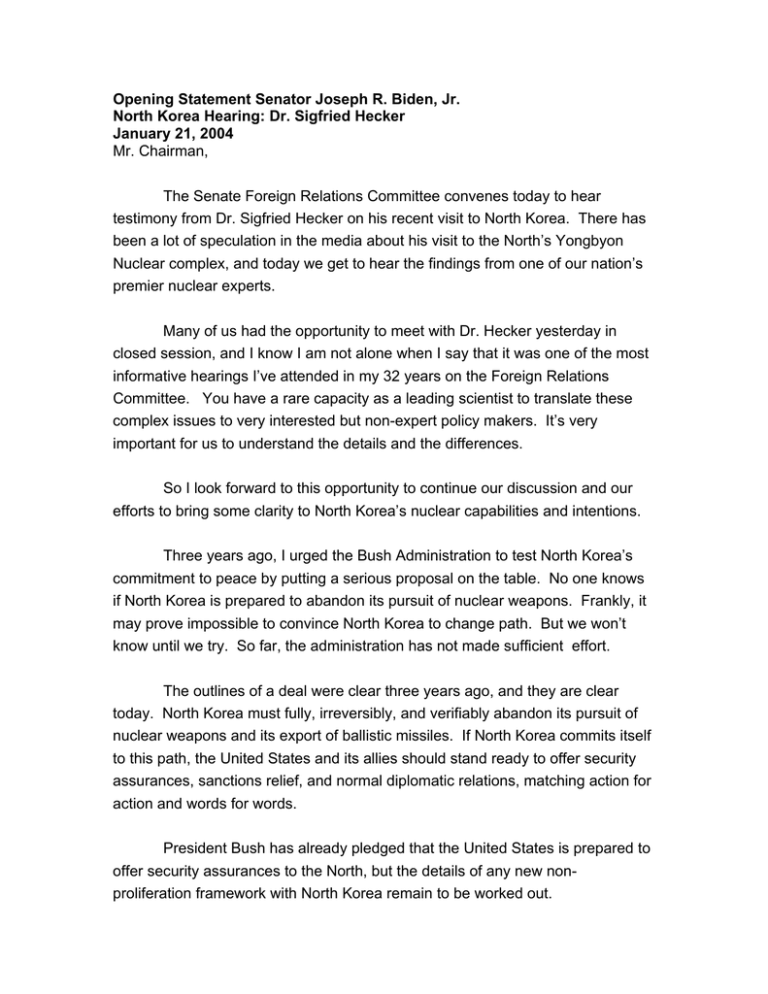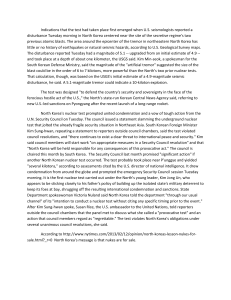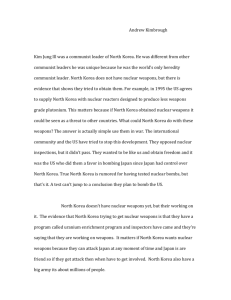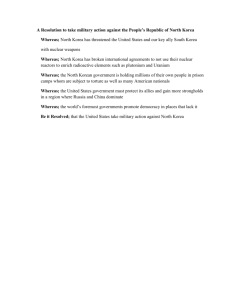Opening Statement Senator Joseph R. Biden, Jr. January 21, 2004
advertisement

Opening Statement Senator Joseph R. Biden, Jr. North Korea Hearing: Dr. Sigfried Hecker January 21, 2004 Mr. Chairman, The Senate Foreign Relations Committee convenes today to hear testimony from Dr. Sigfried Hecker on his recent visit to North Korea. There has been a lot of speculation in the media about his visit to the North’s Yongbyon Nuclear complex, and today we get to hear the findings from one of our nation’s premier nuclear experts. Many of us had the opportunity to meet with Dr. Hecker yesterday in closed session, and I know I am not alone when I say that it was one of the most informative hearings I’ve attended in my 32 years on the Foreign Relations Committee. You have a rare capacity as a leading scientist to translate these complex issues to very interested but non-expert policy makers. It’s very important for us to understand the details and the differences. So I look forward to this opportunity to continue our discussion and our efforts to bring some clarity to North Korea’s nuclear capabilities and intentions. Three years ago, I urged the Bush Administration to test North Korea’s commitment to peace by putting a serious proposal on the table. No one knows if North Korea is prepared to abandon its pursuit of nuclear weapons. Frankly, it may prove impossible to convince North Korea to change path. But we won’t know until we try. So far, the administration has not made sufficient effort. The outlines of a deal were clear three years ago, and they are clear today. North Korea must fully, irreversibly, and verifiably abandon its pursuit of nuclear weapons and its export of ballistic missiles. If North Korea commits itself to this path, the United States and its allies should stand ready to offer security assurances, sanctions relief, and normal diplomatic relations, matching action for action and words for words. President Bush has already pledged that the United States is prepared to offer security assurances to the North, but the details of any new nonproliferation framework with North Korea remain to be worked out. My concern today is much the same as it was three years ago: As North Korea’s nuclear capabilities grow, there is an ever-growing risk that North Korea might choose to export that capability, either in the form of fissile material or technology. As the North’s nuclear arsenal grows, there is also a real and growing risk of war on the Korean Peninsula arising out of miscalculation and miscommunication. And there is the growing risk that far from having a nuclear-free Korean peninsula, the worlds most dangerous weapons will spread to South Korea, Japan and so on. North Korea’s leader Kim Jong-il seems convinced that North Korea is “next” after Iraq, and he sees nuclear weapons as the ultimate guarantee for his regime’s survival. The North is pursuing nuclear weapons even though it imperils its fledgling economic reforms and jeopardizes its attempts to normalize relations with its neighbors. As we will learn today, North Korea has not been idle during the 13 months since it kicked out international inspectors and re-started its facilities at Yongbyon. In fact, the North appears well along the path toward becoming a full fledged nuclear weapons state. Convincing North Korea to change course will not be easy. It requires a combination of sticks and carrots. We must make plain the dangers of the current path – especially our complete intolerance for any form of nuclear exports from North Korea – but we must also hold out the promise of a different future if the North verifiably abandons its pursuit of nuclear weapons and its export of ballistic missiles. We have done an ok job communicating the risks, but we have frankly done a poor job of defining an alternative future for the North Korean people. We have had almost no dialogue with North Korea, holding just three meetings in three years, and all of them coming too late to do much good. At the most recent round of six-party talks in Beijing last August, United States and North Korean officials held only 40 minutes of direct talks – not enough to make much headway. You and the delegation spent more time with senior North Korean officials and nuclear scientists in a few days then the Administration has in three years. So I am eager to hear the testimony of Dr. Sigfried Hecker, one of the premier nuclear scientists in the world. Not part of today’s hearing are other critical concerns of this committee regarding North Korea, especially human rights, food needs and economic issues. As the chairman indicated, our staff experts raised these concerns directly with senior North Korean officials on their trip. We look forward to their full report. ###







